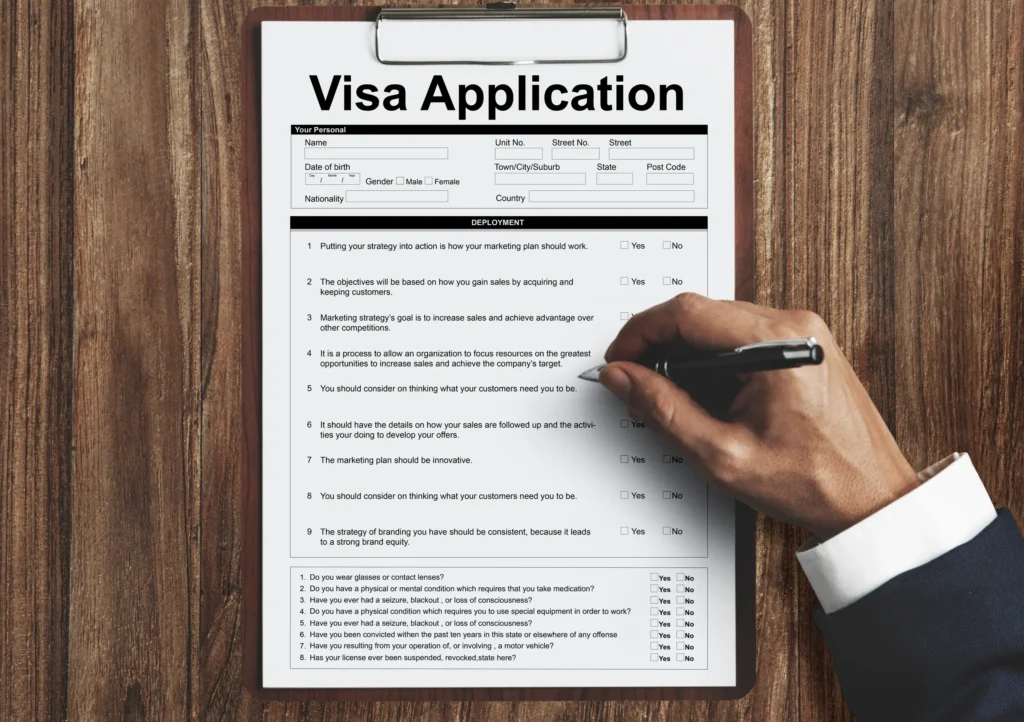H I L F . M I R . D O C H
What is a visa?
A visa is an official document issued by a country that allows a person to enter and stay in the country for a certain period of time, whether for work, study, travel or other purposes. It is important to note that there are different types of visas, each specifying different conditions and rights for staying in the country.
The process of applying for and obtaining a visa can vary depending on the country and the purpose of your stay. However, here are the general steps
How can I apply for a visa ?
Learn about the types of visas available for your desired country and the purpose of your stay. Each country has its own visa categories with specific requirements.
Download the required visa application forms from the official website of the embassy or consulate of the destination country or collect them locally. As a rule, these forms must be filled out correctly and completely.
The documents required may vary depending on the type of visa. Typically required are
- Valid passport
- Passport photos
- Completed visa application forms
- Verification of the purpose of the stay (e.g. job offer, university place)
- Financial proof (to confirm your financial ability to live in the country)
- Health certificates or medical examinations
- Travel insurance (depending on country and visa type)
- Other specific documents depending on visa type
Fill out the visa application forms and submit them together with all required documents to the consulate or embassy of the destination country. In some cases this can be done online.
Pay the visa fees according to the instructions of the consulate or embassy. The fees vary depending on the country and visa type.
In some cases, you will have to hand in your biometric data such as fingerprints or a photo at the consulate or embassy.
Wait for your application to be assessed. Processing times may vary depending on how many applications are currently being submitted.
You will be notified whether your visa application has been approved or rejected. If approved, you will receive your visa in your passport.
With an approved visa you can enter the destination country and stay according to the conditions of the visa. lt is important to check the exact requirements and steps for your desired visa directly with the relevant embassy or consulate of the destination country, as the information may vary depending on the country.
What is a blue card in the EU ?
The “EU Blue Card” is a special residence permit for highly qualified non-EU foreigners who wish to work and live in an EU member state. It was introduced to attract skilled labour from third countries and to promote international competition for talent. The EU Blue Card enables holders to work and reside in an EU country.

Here are some important features of the EU Blue Card:
- Highly qualified specialists: The EU Blue Card is aimed at skilled workers with a university degree or comparable qualifications who wish to work in a profession that requires a high level of qualification.
- Minimum wage: In order to apply for an EU Blue Card, you must have an offer of an employment contract or a job offer from an employer who is prepared to pay a minimum income. The amount of the minimum income varies depending on the country.
- Job offer: The EU Blue Card requires that you have a job offer in a EU country. The employer often has to prove that no suitable candidates from the EU are available to fill the position.
- Work duration: The EU Blue Card is normally issued for an initial period of 1 to 4 years and may then be renewed.
- Mobility: After a certain period of time (usually 18 months), EU Blue Card holders can move to another EU country to work and live there, provided they fulfil certain conditions.
- Family reunification: EU Blue Card holders can usually bring their family (spouse and minor children) with them.
- Permanent residence: After a certain period of legal and continuous residence in the EU, the EU Blue Card can lead to permanent residence.
It is important to note that the exact regulations for the EU Blue Card may vary depending on the EU country. You should check the specific requirements and procedures with the relevant authorities in the country where you want to work and apply for the EU Blue Card.
